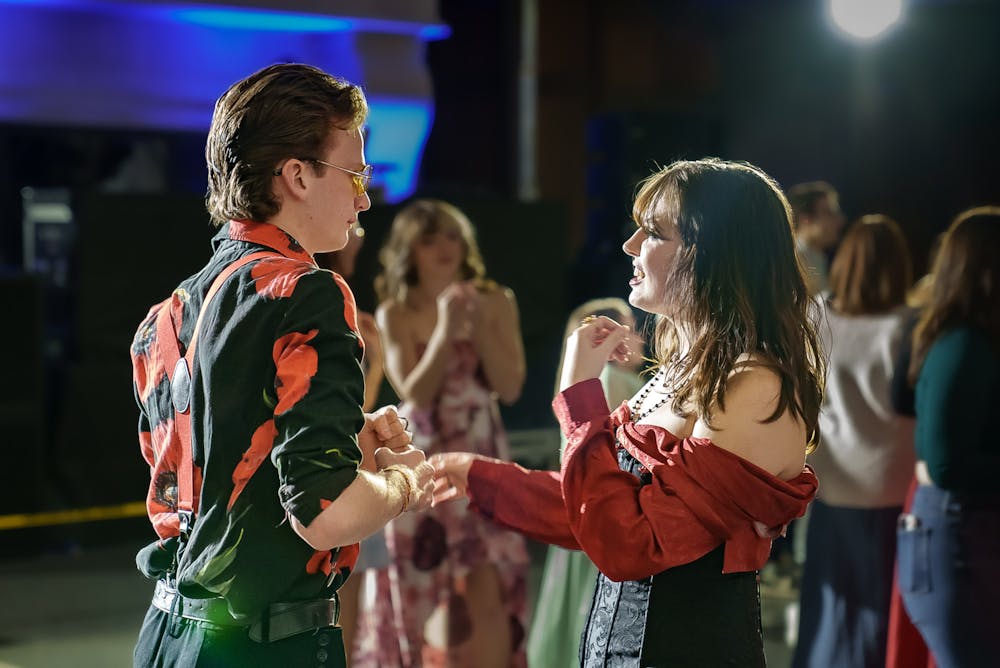Potential students learn about acorns, oak saplings, College Coffee and Numen Lumen during campus tours, but these aren’t the only traditions in which students, families, staff and faculty to participate in.
While these traditions have changed over time — to stay relevant and accommodate a growing student population — these events and activities unite generations of Elon’s community, according to Jana Lynn Patterson, Traditions Council chair and dean of students.
“It speaks to generations of students who have come before them,” Patterson said. “When I think about New Student Convocation, that’s an event that ties students from the 1960s to students coming in the fall of 2024.”
The start of each fall semester includes a variety of Elon traditions that Patterson said immerse incoming students in the university’s community. These traditions include New Student Orientation, the Call to Honor, a hypnotist event at orientation, students receiving their acorn at Convocation and the family picnic. The fall student organization fair is another tradition Patterson said remains an important part of Elon’s culture.
“That certainly is a long standing tradition and begins to allow new students and incoming students the opportunity to think about where they want their social and their belonging piece of their wellness dimensions to to start to thrive and flourish,” Patterson said.
Patterson said the student organization fairs were the traditions that have changed the least overtime, apart from changes during the height of the COVID-19 pandemic.
One tradition Patterson said has changed a lot since it initially emerged is the holiday party with the university president. The celebration started with President J. Fred Young in 1986, according to Patterson.
“He decided he wanted to open his home up to students,” Patterson said. “That has emerged in different iterations to the president’s holiday reception for students.”
The holiday reception continued to be an annual event throughout Young’s presidency, then Leo Lambert’s and now Connie Book’s. Each year, the event changes slightly as the traditions council works to maintain the “core” of the event but keep it relevant and engaging for students.
Instead of being hosted at the president’s house, the reception has most recently taken place at the Inn at Elon. In the first few years, Patterson said Polaroids with the president were an activity at the reception, but now they hire a professional photographer.
The president’s holiday reception isn’t the only December tradition students can look forward to. The Festival of Lights and Luminaries is hosted by the Truitt Center and celebrates the diverse identities and cultures in the Elon community.
Early iterations of the festival in the mid-1980s included candle-lit luminaries around Fonville Fountain, according to Patterson. In recent years, there have been hundreds of luminaries lighting the pathways around the Historic Neighborhood, Under the Oaks and the Lambert Academic Village. Along the paths are also a variety of clubs and departments running activity booths.
Patterson said the Festival of Lights and Luminaries originated as an opportunity for students and the greater Elon community to come together before exams started and students left for winter break.
The Truitt Center hosts a variety of Elon’s traditions. These include weekly Numen Lumen gatherings during the academic year, the Senior Baccalaureate Reflection, Turning 21 and the Ripple Conference.
“Elon is a place where we want you to come in and be more,” Patterson said. “We want it to be about exceptional instruction in the classroom and exceptional engagement in the classroom. It’s equally important that you engage in those experiences.”
Elon’s calendar is scattered with traditions, both longstanding and emergent. Patterson said one of her favorite emergent traditions is the Elon Ball, which she said started around 2018. The ball is an annual, prom-like party that is open to the entire student body.
“It gives an opportunity for students to come back together as a student body, and not so much as affiliated with organizations or affiliated with certain groups,” Patterson said. “I think that’s the beauty of that event.”
Elon’s campus traditions are essential to helping students holistically, Patterson said. While these traditions can bond generations of Elon students, immerse students in Elon’s community and build lasting friendships, Patterson warned against some of the unofficial traditions students have participated in.
Two prominent traditions Patterson said she does not endorse were stealing bricks from the pathways and jumping in Fonville and Chandler Fountains.
“Especially the brick thing, because people don’t realize how dangerous it is,” Patterson said. “Plus somebody’s got to replace that brick, which means somebody’s got to pay to replace that brick, which means community billing to replace that brick.”
Missing bricks are tripping hazards — especially for mobility aid users — and Patterson added that the fountains’ electrical components could cause issues.
“They’re not made to swim in,” Patterson said. “And then somebody brings a bottle and then breaks glass and then somebody steps in it.”
Patterson said she recommends students interested in being involved in campus life start engaging with Elon’s traditions as they happen.
For students looking to get involved in organizing or updating campus traditions, Patterson said the Traditions Counsel is open to student members. Students interested in joining or learning more, can reach out to Patterson directly.


